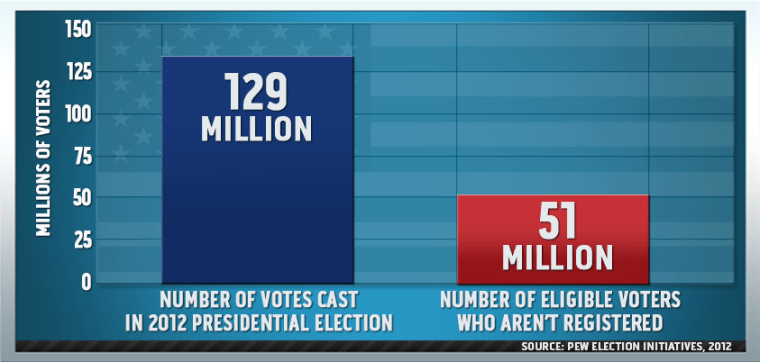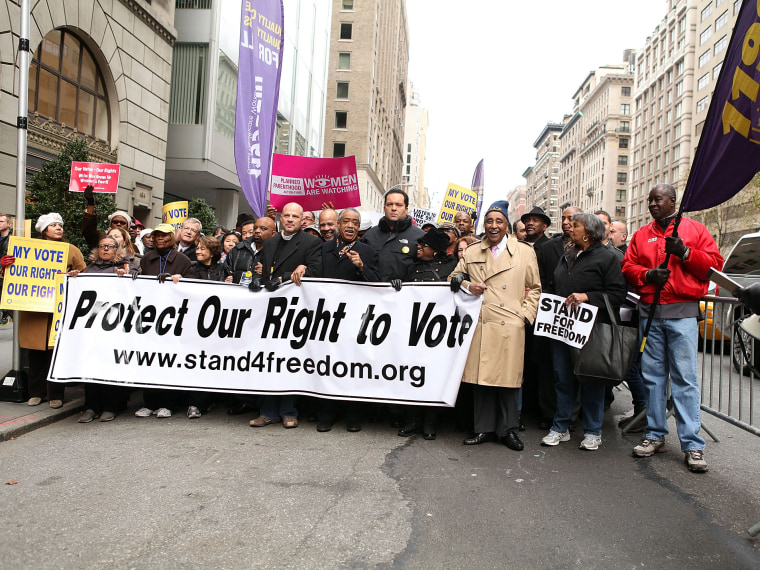In recent years, the issue of voting rights has exploded into a high-octane partisan battle, with Republicans backing laws restricting access to the ballot, Democrats loudly crying foul, and no resolution in sight. But a new presidential panel aimed at fixing problems in the U.S. voting system could offer a way around the stalemate.
Following up on an Election Night pledge to fix the long lines that kept some voters waiting over seven hours to cast a ballot, President Obama last week formally created the Presidential Commission on Election Administration, and gave it a broad mandate to improve the voting experience.
"When any Americans—no matter where they live or what their party—are denied that right [to vote] simply because they can't wait for five, six, seven hours just to cast their ballot, we are betraying our ideals," Obama said in his State of the Union address.
The commission—chaired by two prominent Washington election lawyers, Democrat Bob Bauer and Republican Ben Ginsberg—has six months to deliver a report with recommendations for fixes. The White House declined to provide information about the expected date of its first meeting, and about the commission’s hiring plans and budget. Aides have said that the commission will also contain customer-service experts and election officials.
The panel faces some significant challenges. Its recommendations are non-binding, and even if Obama decides to take them up, he’d need the support of Congress to make real improvements. Many Republicans—including Rep. Candice Miller, who oversaw elections as Michigan’s secretary of state and now chairs the House committee with jurisdiction on the issue—oppose federal efforts to streamline and standardize elections, arguing that election administration should be left to the states.
Nor is recent history encouraging. An existing federal panel, the Election Assistance Commission, has been mired in partisan bickering since its creation more than a decade ago as an information resource on election administration in response to the fiasco of Florida in 2000.
MYRIAD VOTING ISSUES
But there are also reasons for cautious optimism. Despite the media focus on voter fraud and voter suppression, experts say many of the most serious problems with the voting system—including the ones that contributed to those excessive wait times—could offer some common ground for the parties.
First among them is the voter registration system. A Pew study last year found that voter rolls contain more than 4.5 million duplicates or names of dead people—a problem Republicans say requires urgent attention since it could allow for fraud. Meanwhile, at least 51 million eligible citizens—almost a quarter of the eligible population, and far more than the total number of voters likely to be disenfranchised by voter ID laws and other GOP-backed restrictions—still aren’t registered (see chart below). That’s something Democrats want to address, because that population likely leans toward their party.

So, many voting experts say, states should be required to take responsibility for registering all eligible voters, and purging inaccuracies. Pew also recommends encouraging states to make it easier to register online, and giving them the tools to identify mobility within states and across state lines, so you don’t have to re-register every time you move.
Such an approach “offers a chance for an armistice in the endless trench warfare over voting,” Michael Waldman, the president of the Brennan Center, wrote recently in the journal Democracy. “Instead of joylessly repeating the same fights over 'voter fraud' and potential suppression, here is a reform that helps solve both problems at once.”
Other issues afflicting the system, like insufficient facilities and problems with voting machines, will need to be addressed on more of a case-by-case basis.
“This is not a one-size-fits-all problem,” David Becker, the president of Pew Election Initiatives, told msnbc. “The problems in Miami-Dade might not be same as in Cuyahoga.”
The choice of commission chairs has been controversial, but it may end up boosting the panel’s chances of accomplishing something. Some critics complain about Bauer and Ginsberg's partisan backgrounds—Bauer has worked for Obama’s campaign and for the White House, while Ginsberg was the top lawyer for Team Romney.
“We do have some concerns that picking two partisans that have represented the parties is not necessarily going to lead to the best solutions for citizens,” Elizabeth MacNamara, the president of the League of women Voters, told msnbc.
But those backgrounds appear more likely to be a feature than a bug.
“We live in a partisan environment,” Becker said, calling both men “thoughtful experienced people who are respected across the ideological spectrum.” More important, he said, having people who can bring their parties along is crucial “to get any recommendations adopted by both the reddest state and the bluest.”
